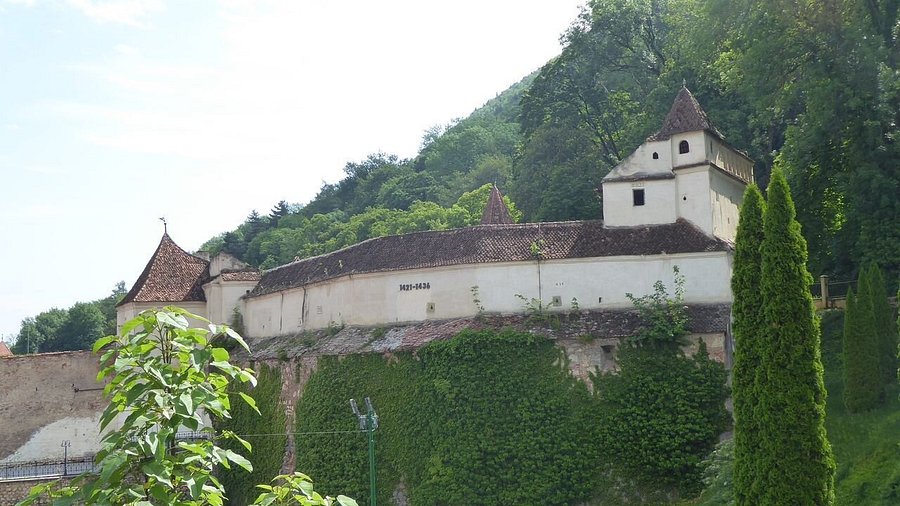During a visit to Transylvania, Romania, the next place we traveled to was:
2) Brașov

After the visit to Peles Castle, we took a train to Brașov, one of Romania’s most charming and visited cities. It is nestled in the heart of Transylvania and surrounded by the Carpathian Mountains. Founded in the 13th century by the Teutonic Knights and later settled by the Saxons, Brașov became a significant commercial hub due to its strategic position on the trade routes between East and West. The city’s rich history is reflected in its well-preserved medieval architecture, fortifications, and cultural landmarks. We spent a day exploring the city and here are some of the highlights:
Exploring the Old Town
Exploring the Old Town, with the central square and colorful Baroque buildings, was such a treat. Everywhere you look there were charming colorful buildings and shops. The Council Square (Piața Sfatului) is the heart of the Old Town. Shops, cafes and restaurants surround the square and here we enjoyed both of our meals while in Brasov. Additionally, this is where many of Brașov’s festivals and events take place, and it’s an ideal spot to relax while soaking in the city’s atmosphere. The square also features the Council House, a 15th-century building that now houses the Brașov History Museum.





The Black Church (Biserica Neagră)

After lunch, we headed to the Black Church- the symbol of the city. We bought a ticket to visit this iconic Gothic church, which dates back to the 14th century. When we entered the church we were approached by a young man who offered to give us a free tour. We found out later we were his first ever tour! The church is named after the fire that damaged its walls in the 17th century, leaving them blackened. There is one mural that wasn’t destroyed depicting the Nativity, Saint Catherine and Saint Barbara. Our guide pointed out the many impressive architectural details. This includes the high vaulted ceilings, intricate woodwork (including pews which can change the direction they face), a collection of oriental carpets and the mural tombs.






The church is also home to one of the largest pipe organs in Romania. A concert was taking place when we visited and we were lucky enough to enjoy. Make sure to visit this church, the largest Gothic church in the country, while in Transylvania, Romania. It is open from 10-6 except for Sunday when it opens to visitors at noon. The tickets are 20 RON, which is about 4 US dollars.
Catherine’s Gate (Poarta Ecaterinei)
The only original city gate that has survived from the medieval times in Brasov is Catherine’s Gate. It features four small corner turrets symbolizing judicial autonomy.

Ascend Mount Tâmpa
Mount Tâmpa rises 400 meters above the city, offering panoramic views. Visitors can get to the top by cable car, a quick way to reach the top while enjoying scenic views. Or hiking enthusiasts may enjoy ascending via walking trails of varying difficulty. On the top is the Brașov Sign, which is similar to the Hollywood sign.

Weavers’ Bastion (Bastionul Țesătorilor)

Weavers’ Bastion is part of the old defensive structures in Brasov, and is now a museum. It has exhibits on the history of the guilds and the city’s defense systems.
Black Tower and White Tower
Brasov has two defensive towers which offer insights into the medieval fortifications of the city. Visitors can climb to the top of the towers for excellent views of the old town.



Discover the Șchei District
The Schei District is a historic Romanian neighborhood outside the old Saxon city walls and includes the Schei Gate. Here, we also saw the Beth Israel Synagogue. We had a great time just exploring the beautiful town of Brasov and surrounding area, meandering the winding streets and taking in the sites.






Click here to continue reading about Sibiu



